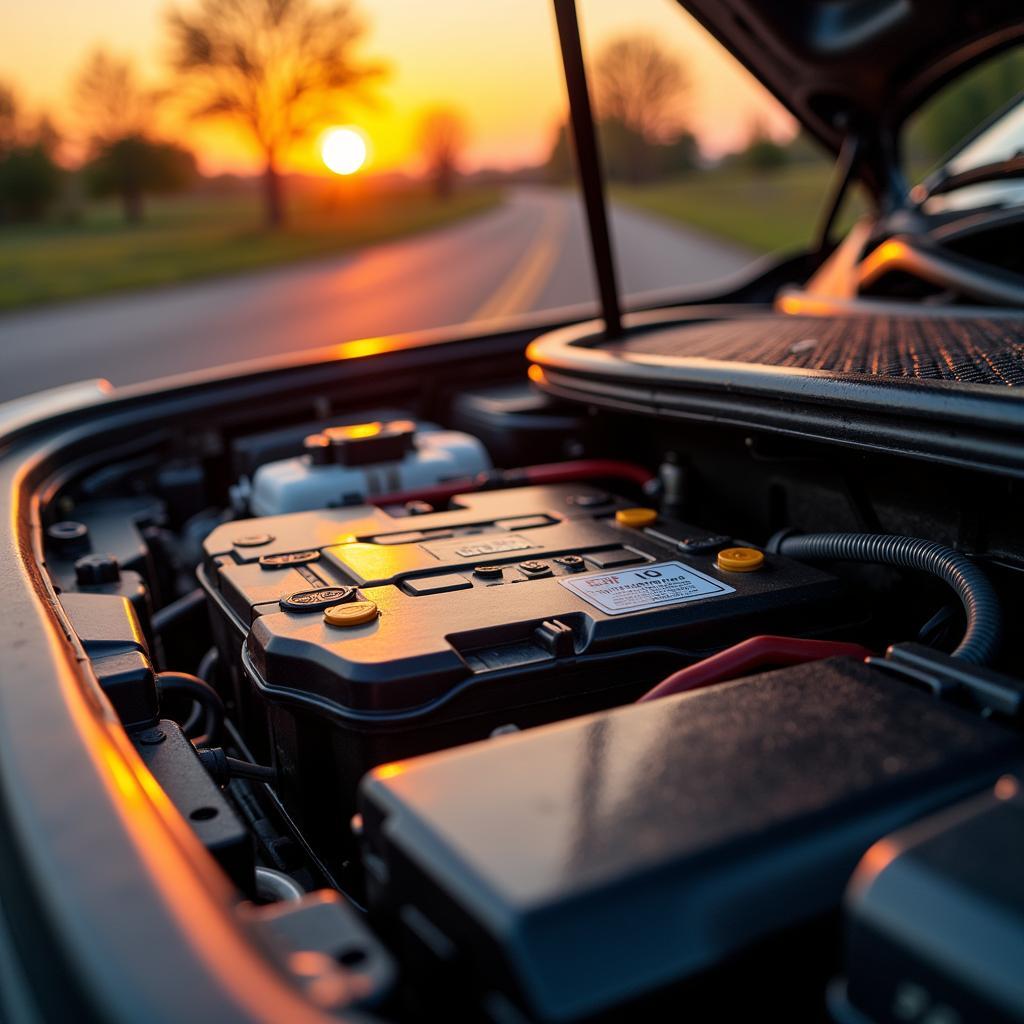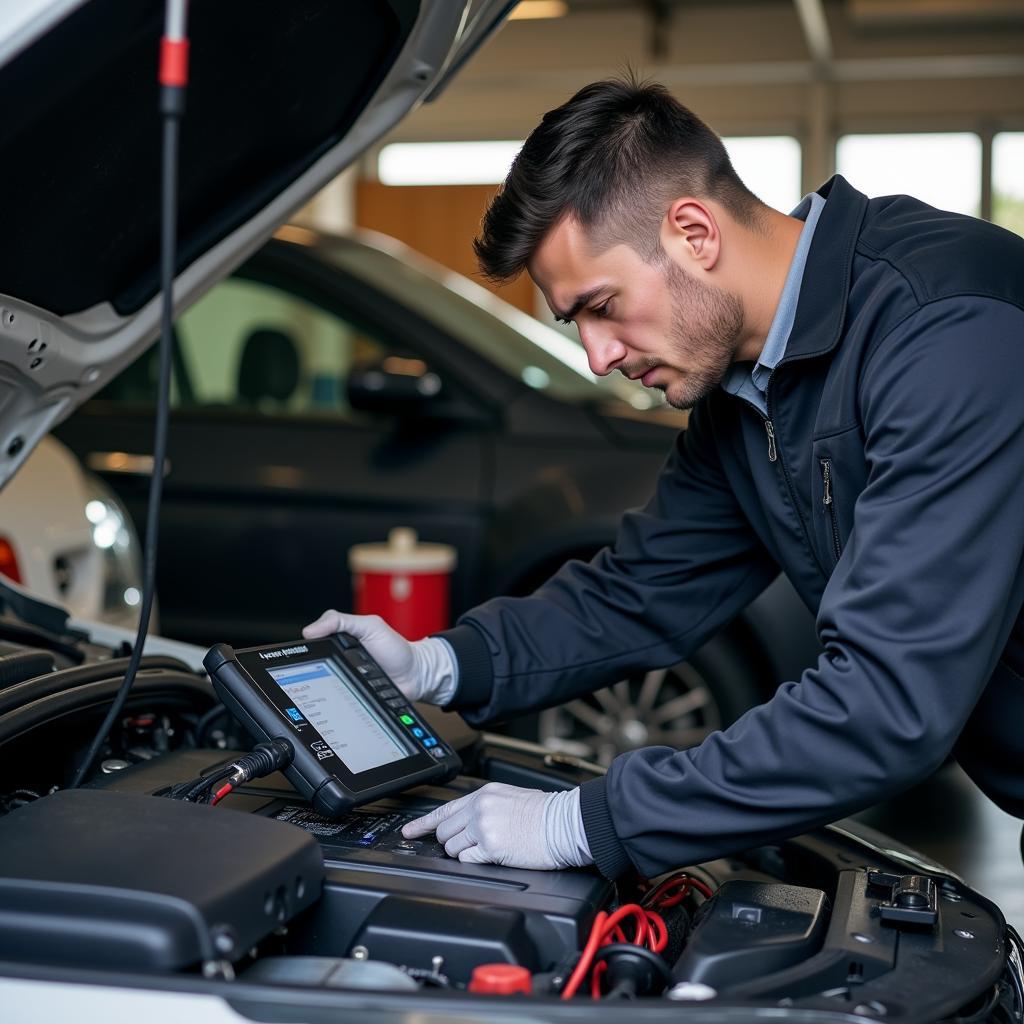Extreme temperatures, especially scorching summer heat, can impact your hybrid car battery’s performance and lifespan. Just like conventional car batteries, hybrid batteries are susceptible to temperature fluctuations. Understanding how heat affects your hybrid battery can help you take preventative measures and prolong its life. car remote start can be a useful tool, especially in hot weather, offering ways to mitigate some of these effects.
How Does Heat Impact Hybrid Car Batteries?
Hybrid car batteries, typically nickel-metal hydride (NiMH) or lithium-ion (Li-ion), operate within an ideal temperature range. Excessive heat can accelerate the chemical reactions within the battery, leading to increased internal resistance and reduced energy storage capacity. This means your hybrid might not achieve the same fuel efficiency or electric-only range in hot weather as it would in milder conditions.
Heat can also contribute to faster degradation of the battery’s internal components, shortening its overall lifespan. While hybrid batteries are designed to withstand a certain degree of heat stress, prolonged exposure to extreme temperatures can cause permanent damage.
 Hybrid Car Battery in Hot Weather
Hybrid Car Battery in Hot Weather
Signs Your Hybrid Battery is Affected by Heat
Several indicators might suggest your hybrid car battery is being negatively affected by hot weather:
- Decreased fuel economy: If you notice a significant drop in your miles per gallon, especially during hot spells, it could be a sign of a heat-stressed battery.
- Reduced electric-only range: Hybrids relying more on the gasoline engine and less on electric power, even in situations where the battery would normally suffice, can suggest a heat-related issue.
- Sluggish acceleration: Reduced power output from the battery can lead to slower acceleration, particularly noticeable when starting from a stop.
- Battery warning light: In more severe cases, the car’s computer might detect a problem with the battery and trigger a warning light on the dashboard.
Protecting Your Hybrid Battery from Heat Damage
Fortunately, there are several proactive steps you can take to protect your hybrid battery from heat damage and maintain its performance:
- Park in the shade: Whenever possible, park your hybrid in a shaded area or garage to minimize direct sunlight exposure.
- Use a sunshade: A reflective sunshade can significantly reduce the temperature inside your car, protecting both the battery and the interior.
- Ventilate your car: Opening windows or using the car’s ventilation system can help dissipate heat buildup inside the vehicle.
- Monitor the battery’s performance: Pay attention to your fuel economy and electric-only range, especially during hot weather, to identify any potential issues early on.
- Keep the battery cool: Some hybrid models have active cooling systems for the battery. Ensure this system is functioning correctly, especially in extreme heat.
Does Extreme Cold Also Affect Hybrid Car Batteries?
While this article focuses on heat, it’s important to note that extreme cold can also affect hybrid battery performance. Low temperatures can slow down the chemical reactions within the battery, reducing its capacity and power output.
What Should I Do if I Suspect My Hybrid Battery is Damaged?
If you suspect heat or any other factor has damaged your hybrid battery, it’s crucial to have it inspected by a qualified technician. They can diagnose the issue and recommend appropriate repairs or replacements.
 Mechanic Inspecting Hybrid Car Battery
Mechanic Inspecting Hybrid Car Battery
Conclusion
Hot weather can indeed affect your hybrid car battery, impacting both its performance and lifespan. However, by understanding how heat affects the battery and taking appropriate preventative measures, you can minimize these effects and keep your hybrid running efficiently for years to come. Regular maintenance and timely inspections are key to preserving the longevity of your hybrid battery, especially in challenging climates. Remember, keeping your hybrid battery healthy also contributes to optimal fuel efficiency and reduced environmental impact. Does hot weather affect hybrid car battery? Yes, but you can mitigate the risks!
FAQ
-
Q: How long do hybrid car batteries typically last?
- A: Most hybrid car batteries last between 8 and 10 years, although this can vary depending on usage and climate.
-
Q: Are hybrid batteries covered under warranty?
- A: Hybrid batteries are typically covered under a separate warranty from the rest of the car. Check your owner’s manual for specific details.
-
Q: How much does it cost to replace a hybrid car battery?
- A: Replacement costs vary depending on the make and model of your hybrid but can range from a few thousand dollars to upwards of $5,000.
-
Q: Can I prevent heat damage to my hybrid battery entirely?
- A: While you can’t entirely eliminate the effects of heat, you can significantly minimize them by following the preventative measures outlined in this article.
-
Q: Is it safe to drive my hybrid in extreme heat?
- A: Generally, it’s safe to drive a hybrid in hot weather, but be mindful of the potential impact on battery performance.
Common Scenarios Involving Heat and Hybrid Batteries
-
Scenario: You notice a significant decrease in fuel economy during a summer road trip.
-
Possible Issue: Heat stress on the hybrid battery is reducing its efficiency.
-
Solution: Park in the shade whenever possible, use a sunshade, and ensure the car’s ventilation system is working properly.
-
Scenario: Your hybrid struggles to accelerate in hot weather.
-
Possible Issue: Reduced battery capacity due to heat is affecting power output.
-
Solution: Have the battery inspected by a qualified technician to determine if it needs replacement.
Further Exploration
For more information related to car maintenance and technology, explore these related articles on our website:
Contact Us
For any assistance or inquiries, please contact us via WhatsApp: +1(641)206-8880, Email: [email protected] or visit our address: 276 Reock St, City of Orange, NJ 07050, United States. Our customer service team is available 24/7.


